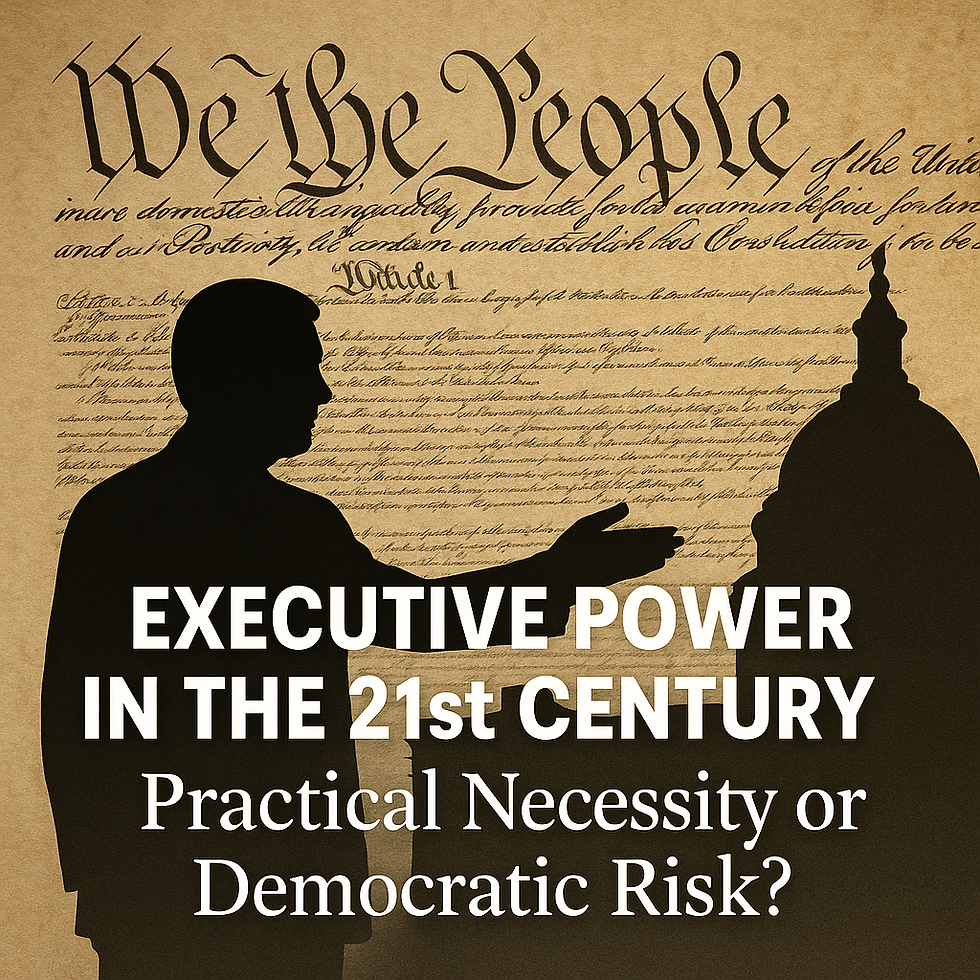Trump’s Immigration Crackdown Highlights the Real Issue: Congress Must Act on Reform
- Dr. Johnson -UnTangled Talk

- Sep 3, 2025
- 3 min read
Immigration enforcement is once again at the forefront of American politics. The Trump administration has made clear its intention to ramp up arrests of undocumented immigrants across the interior of the United States, leveraging the capabilities of Customs and Border Protection (CBP), Homeland Security Investigations (HSI), and Enforcement and Removal Operations (ERO).
For some, this renewed emphasis signals a long-overdue crackdown. For others, it raises humanitarian and logistical concerns. Yet regardless of where one stands ideologically, there is a fundamental truth that cuts across partisan divides: the United States cannot continue to avoid comprehensive immigration reform.
The Numbers Don’t Add Up
Estimates suggest between 11 and 21 million undocumented immigrants reside in the United States (Pew Research Center, 2021; FAIR, 2023). Even if one assumes the lower end of that spectrum, the notion of identifying, processing, and deporting such a population within three or even five years is implausible.
To illustrate: the immigration court backlog already exceeds 3.5 million cases (TRAC Immigration, 2024). Adding millions more would grind the system to a halt. Law enforcement resources would be consumed chasing down individuals who, in many cases, pose no criminal threat beyond a misdemeanor border crossing or visa overstay. This would divert critical manpower away from genuine threats, including cartel networks, transnational gangs, and human traffickers.

Enforcement Without Reform Is a Cycle
History shows us that surges in immigration enforcement ebb and flow with each administration. Yet absent structural reform, the underlying problems remain. Raids may temporarily suppress undocumented populations in certain regions, but they do not resolve the broader issues of labor demand, humanitarian obligation, and border management.
Both Republican and Democratic administrations have cycled through versions of enforcement-first policies (Remember, Obama was once even called the deporter-in-chief). What has been consistently missing is bipartisan agreement on a framework that balances accountability, fairness, and practicality.
A Pathway with Accountability
One potential reform approach could establish a pathway to legal status, not blanket amnesty, but a structured process with consequences. Individuals who have resided in the U.S. for a substantial period, say eight years or more, and who have committed no criminal offenses beyond civil immigration violations, could apply for status.
Instead of amnesty, they would face financial penalties. For instance, a three- to five-year period of tax penalties could be imposed: no deductions, no refunds, no exemptions. These penalties would recognize the violation of U.S. law while providing a pragmatic way forward. In effect, it would be a form of restitution to the American taxpayer.
Meanwhile, immigration enforcement agencies could redirect their efforts toward high-risk targets, criminal aliens, cartel operatives, and recent unlawful entrants. This targeted approach would better align with public safety goals while acknowledging the fiscal and logistical reality that mass deportation of millions is unachievable.
Respecting Those Who Played by the Rules
Critics of reform often point to fairness: why should those who broke the law be rewarded while others waited years and paid fees to immigrate legally (I agree with this sentiment)? A system of penalties addresses this concern by ensuring that undocumented immigrants pay a tangible price for circumventing U.S. law. At the same time, it resets the enforcement system to focus forward, not backward, ensuring that future violations are treated with greater consistency and consequence.
Congress Must Lead
The truth is that no administration, Republican or Democrat, can resolve this issue through executive action alone. Enforcement may generate headlines, but only Congress can pass legislation that addresses the scale and complexity of immigration in America. It is also important to note that Immigration reform has long been politically fraught, but continuing to defer action is intellectually dishonest. A nation of laws cannot ignore millions living outside the system. A nation of immigrants cannot deny that its economy and communities are deeply intertwined with those very people. Comprehensive reform is not about amnesty. It is about realism, accountability, and restoring focus to immigration enforcement priorities that actually enhance national security.
Final Thought
Trump’s latest push for nationwide immigration arrests underscores a problem that has persisted for decades: enforcement without reform is a treadmill. Until Congress acts, we will continue to cycle through the same debates, expend the same resources, and avoid the hard but necessary choices that true reform requires. Both political parties have used the immigration debate as a political platform leveraged to garner voter support. One should ask whether Congress acts and brings some calm to this forever storm. It is time to face reality. America needs Congress to establish comprehensive immigration reform!
Please share your thoughts!



Comments